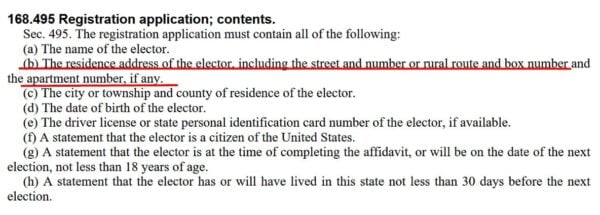This article, part of MI Fair Elections ongoing series on the Qualified Voter File (QVF), addresses the importance of an accurate, complete address when registering or reregistering to vote.
According to Michigan law, voter registrants are required to provide their residential and mailing addresses. An applicant’s residence consists of the location where they live and sleep, so it cannot be a post office or similar facility that deals with delivering mail or packages. Registrants are required to include the necessary information for them to receive mail, including street and number or rural route and box number and apartment number, if any. The law enables each registrant to receive documents for voting in-person or absentee and other official mailed communications. Access to accurate mailing and residential information is necessary for election officials to help ensure free and fair elections.
So, why are approximately 50,000 Michigan registrants recorded at illegal addresses of record?

Michigan law, MCL 168.495 requires registrants to provide their residence address, including street and number or rural route and box number and apartment number, if any.
Many types of residences have multiple people living at the same street number and street name. Due to the size of some of these facilities, including apartment complexes, manufactured home sites, and college dorms, the U.S. postal service be unable to deliver a voter registrant’s mail without further specifics like apartment numbers, lots numbers, and dorm rooms or mailboxes.
In East Lansing, at The Landings of Chandler Crossing, a primarily student housing apartment complex that can house more than 1,500 residents. The mailing address for all residents is 16789 Chandler Rd, followed by a residence extension indicating the apartment number. At The Landings, each apartment is subdivided into as many as four separate bedroom and bath areas, each with its own unique lease. For this reason, the apartment address is further indicated with a letter designation for the room after the apartment number, for example, 1221A, 813B, or 323C.
Lacking this level of designation, a mail carrier would find it virtually impossible to deliver mail reliably to its intended recipient. An example of a correct address at The Landings is 16789 Chandler Rd, Apt 1221A.
Dormitories also require a residence extension. Room addresses at the six-story Holmes Hall at Michigan State University indicate the floor and have East and West wing designations. Timely and accurate delivery of mail cannot happen without the residence extension included in the address.

Oak Island Village in Bath Township is a 250-lot mobile home community located at 16430 Park Lake Road in East Lansing. Despite several named streets posted within the community—none of which is Park Lake Rd.—the mailing address for all lots is 16430 Park Lake Rd, with a residence extension for the lot number. These lot numbers are posted on the outside of each mobile home.

While there are mailbox islands within the complex, anything requiring a signature for delivery could not be left at these islands.

Michigan’s official voter rolls, called the Qualified Voter File or QVF, contain approximately 50,000 registrants recorded as living in multi-unit housing units but lacking a residential extension number. How these ineligible registrations occurred or why the Secretary of State’s office is failing to address the problem remains unclear. But one thing is clear: These registrations violate the law, and absentee ballots cannot be delivered to them.
Michigan’s membership in the Electronic Registration Information Center (ERIC) was sold to the public as a system to help clean voter rolls. If ERIC, a third-party, private organization that refuses to respond to FOIAs, is doing its job, why, after four years of membership, are Michigan’s rolls cluttered with more ineligible registrations than ever?
Through the efforts of election integrity groups like Michigan Fair Elections, volunteers are examining the voter rolls in their own communities and working with their local clerks to identify registration anomalies.
Checkmyvote.org, a database system developed by two talented volunteers, provides free online access to public information on voter registrants in Michigan’s 83 counties. Each month, CMV obtains the Qualified Voter File from the Secretary of State’s office. Then the Check My Vote (CMV) team analyzes and compares various aspects of Michigan’s QVF files with the goal of cleaning the rolls and keeping them clean.
Checkmyvote.org provides this comparative data to election integrity groups and individuals in counties throughout Michigan. In addition to helping groups and individuals identify and remedy their counties’ issues, CMV enables analysts in MFE’s Soles to the Rolls program and other organizations to compare the various month’s data and evaluate their progress in helping clerks clean the voter rolls.

The chart above shows information for the overall state of Michigan. This information is also readily available for each of Michigan’s 83 counties. For more information, readers may go online to Checkmyvote.org.
A future article in this series will discuss legislation and governmental executive directives that have contributed to the growing issue of corrupted voter rolls and the pathways for restoring accuracy.
About the author:
Anne Hill serves on MFE’s Board of Directors and its Communications Team. She holds an Executive Master of Business Administration degree from Northwood University’s Graduate School of Management and is a 16-year resident of the City of East Lansing,
https://www.thegatewaypundit.com/2023/08/new-stunning-findings-michigans-dirty-voter-rolls-reveal/
https://www.americanthinker.com/blog/2023/08/the_statistical_fraud_of_multiple_counts_and_courts.html
https://www.thegatewaypundit.com/2023/08/breaking-new-details-via-local-muskegon-police-report/
https://thefederalist.com/2023/08/29/biden-admins-voter-drive-for-newly-naturalized-citizens-is-just-another-act-of-federal-election-interference/

No comments:
Post a Comment